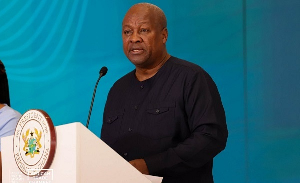Cape Coast, April 5, GNA - The Central Regional Director of Education, Mrs. Justina Torjagbo, on Tuesday, expressed concern about the lack of toilet and other sanitary facilities in most of the basic schools in the region.
According to her, the situation was creating truancy among pupils, since some of them use the lack of such facilities as an excuse to cut classes, under the pretext of going home to attend nature's call. Mrs. Torjagbo expressed this concern at the regional launch, and orientation workshop on the 'School Hygiene Education Component (SHEP) at Cape Coast.
The workshop, which was attended by district directors of education, district chief executives, district coordinating directors and regional and district training officers, was to ensure that schools have access to the requisite education on hygiene.
The Regional Director stressed the need for the provision of sanitary facilities in schools and urged teachers, to teach the children good sanitation and personal hygiene, and suggested that the inspection of pupils' fingernails and school uniforms, be reintroduced.
She commended DANIDA for supporting the SHEP programme, and said it would go a long way to help improve sanitation at the basic school level and in the nation as a whole.
Professor Kofi Awusabo-Asare, Dean of the Faculty of Social Science at the University of Cape Coast, who launched the programme, commended DANIDA for its support and called for commitment from the district assemblies and other stakeholders to enable the programme achieve the desired objective.
Prof Awusabo-Asare noted that, essence of development was to improve the quality of life, devoid of disease, poverty and hunger and stressed that the nation was far from achieving its development needs, since it was still battling with disease, poverty and hunger. He urged Ghanaians to take their health care needs seriously and ensure environmental cleanliness, stressing, "cleanliness is next to Godliness".
Mrs. Mary Quaye, National Chairperson of SHEP, announced that DANIDA was supporting Central, Eastern, Volta and Greater Accra regions with a total amount of 2.5 million dollars for the implementation of the second phase of the SHEP.
She said the programme, which spans a period of four years, involves policy monitoring management support, district-based water sanitation, integrated water resource management and school sanitation and hygiene education.
She said it would however, focus on hygiene education in schools and school related hygiene promotion and urged all stakeholders in the educational sector to contribute towards its success
Mrs. Quaye tasked the participants to encourage community participation in the programme and to ensure that facilities provided, were sent to areas that are mostly in need of them.
Nana Amba Eyiaba, Krontihemaa of Oguaa Traditional Area, who presided, called for the re-introduction of hygiene and health education in school curricula, and urged stakeholders and the sponsors of the programme to help provide the needed facilities that would enhance the success of the programme.
The participants were taken through topic like "Importance of School Sanitation and Hygiene Education to the School Child", the Role of Community Water and Sanitation Agency in the SHEP programme and "Roles and Responsibilities of Stakeholders in the Implementation of SHEP".
Regional News of Tuesday, 5 April 2005
Source: GNA












